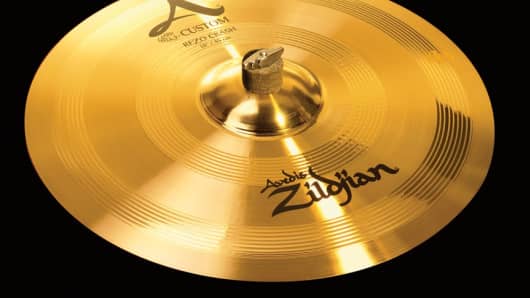When was the last time you heard this in an American factory?
"I've been here 26 years in June," Mark Lovell says, leaning toward me as telling a secret, "and I've never seen a layoff, ever."
Lovell is confident that the 70 workers on his production line will always have good-paying jobs, because no one competes with a machine. Whenever a task is automated, the employee who performed it is trained for another one worth equivalent pay.
"Taking a break while the machine's taking a break, huh?" The boss, Debbie Zildjian, laughs as she holds a door open for George Plaskas. The Greek immigrant has been retrained seven times in 40 years. Plaskas raised two kids in a solidly middle-class neighborhood.
American industry was built by such immigrants, who looked beyond quarterly profits. And today, the Zildjian cymbal factory in Norwell, Mass., still does.
Click here for related videos.
(Read more: Youngstown's Story: Rust Belt Turns to 'Tech Belt' in the Name of Jobs)
For 15 years, Debbie Zildjian, has offered incentive pay, not just for working faster or producing more, but for jobs that are done right the first time. "There were only two months out of those 15 years where we haven't had a payout," she points out.
Every person on the line must approve the work they do. That's a big reason why Debbie's sister, Craigie, the CEO, has never outsourced a job overseas.
Take a look inside the production facility of Zildjian, America's oldest family business, and see how its renowned musical instruments are made.
"The notion of sending your quality, outsourcing your quality halfway around the world," Craigie says, "is unthinkable."
The Zildjian Company makes cymbals. Leon Chiappini has been testing them for more than half a century. "You're not going to find two of them that are the same," Chiappini says. "They're like snowflakes. Each sound is unique."
Cymbals were hardly heard at all in popular music before Craigie's and Debbie's grandfather made some of them thinner and found a rainbow of sound. He did this during hard times, the start of the Great Depression. Avedis Zildjian III began hiring as businesses all around him were firing. He lured good workers with a simple promise.
(Read more: 3-D Printing Sparks Innovation Among Small Companies)
"It comes down to trust doesn't it?" Craigie says. "You take care of us, and we'll take care of you." That pledge has remained unbroken since the beginning.
The Zildjian Company has outlasted empires. It began in Turkey back in 1623, survived the move to Massachusetts, and thrives even during economic turmoil.
(Read more: With CEO Out, Merchants Rethink Groupon)
Matt Flynn, drummer for the band Maroon 5, sits down with TODAY's Bob Dotson to talk about Zildjian cymbals and the differences between individual cymbals.
Quality became more than a slogan. The 125 Americans in this little factory cornered more than half the cymbal market in the world. Who better to tell us how to create and keep good jobs than a company in business for 390 years?
"Our dad always said, 'follow the music,'" Debbie says. And they did, from big bands to the Beatles, classical to jazz. Debbie pointed to pictures of the legendary drummers who have used their product: Buddy Rich, Gene Krupa, Ringo Starr. They were invited to help the company innovate.
And musicians still do today. They can test their cymbals in a pressurized room that re-creates the acoustics of concert venues across the country, giving them a chance to hear how cymbals will sound before they perform.
Zildjian's success attracts people with deep pockets. "Have you ever been tempted to sell the company?" I asked Craigie.
"Oh, almost weekly. We could be quite wealthy. But we're not tempted." Because Debbie's 4-year-old granddaughter is in line to take over one day.
The CEO pushes back from her desk and asks the little girl: "Do you want to work at the company, Emilia?"
The job won't be handed to her when she gets bigger. Every Zildjian in the family business must first prove their worth working outside the firm. But Emilia doesn't hesitate. She answers emphatically: "Yes."
New electronic cymbals have already been named after her generation of Zildjians — the 16th.
To contact the subject of this American Story with Bob Dotson, write to: zcustomercare@zildjian.com
(Read more: Made in the USA: More Consumers Buying American)


